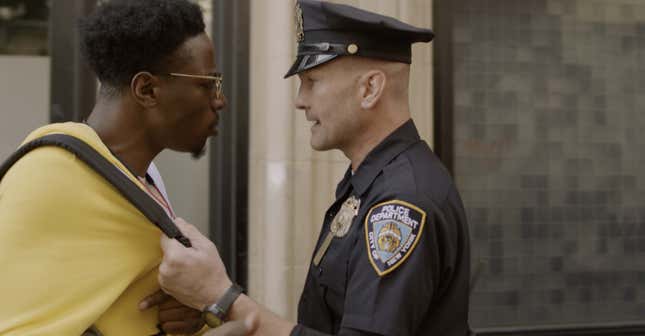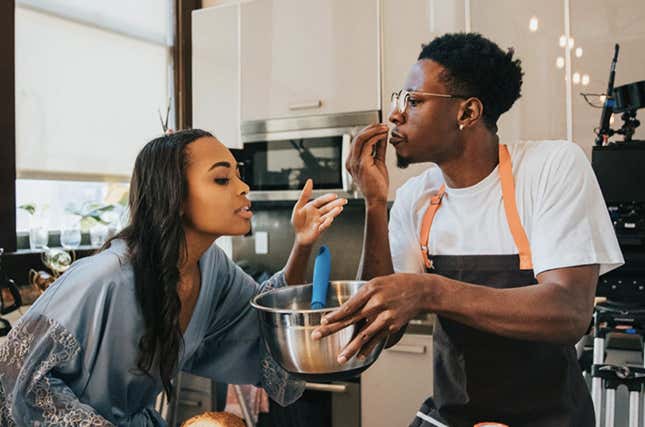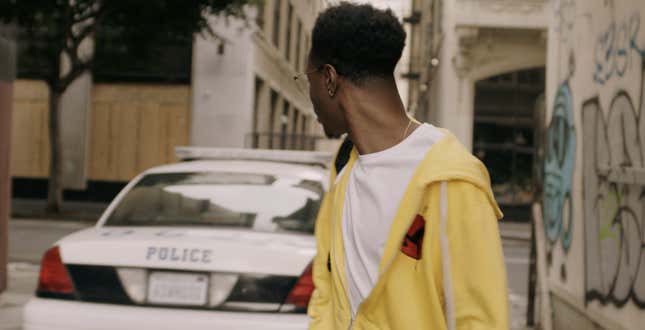
I’ve always had a fascination with Run Lola Run.
In this film, Lola, played by Franka Potente, has to deliver 100,000 Deutschmarks in order to spare her boyfriend from a rather unsavory fate. But the catch is that each time she fails, the movie resets itself and she has the opportunity to learn from her mistakes and try again. It’s a unique twist on the eternal debate of determinism vs. free will, and I always wondered how a similar plot device could be applied to a more relatable concept.
Sadly, I failed miserably at ever conceptualizing one myself, but with Two Distant Strangers—the short film currently turning heads and receiving Oscar buzz in the process—Emmy award-winning writer and producer Travon Free uses a similar Groundhog Day approach to explore the inevitability of racially motivated police violence—a subject that as a Black man in America, I know all too well.
Joined by executive producers Van Lathan and Nicholas Maye, Free sat down with The Root to discuss this film, its nuances and motivations and why it’s the perfect launchpad for their new production company, Six Feet Over.
This interview has been edited for clarity and brevity.
The Root: You’ve taken a unique approach to a subject that is all too familiar with Black folks— that being police brutality. What made you decide to approach this subject in this manner?
Travon Free: It was thinking about how we often feel with the repetitive nature of hearing about police brutality stories and having to process the emotions that we go through. Every time we hear about one of these stories, there’s anger. They happen so frequently that It takes a physical toll on your body, like scientifically. It shortens your lifespan to have to continually go through processing those types of emotions.
And so it’s a thing that we often try to explain to white people and people who don’t get it, what it is and what it feels like. And so this felt like a great way to visualize and bring to life. What it feels like to be us and to live through this thing every single day, all the time. That was kind of the driving force behind coming up with the Groundhog Day-style device to tell that story.
The Root: For me, it was the perfect mechanism to explain the inescapability of police brutality. No matter what we do, we’re still gonna be perceived as a target. Was there a specific inspiration behind this film?
TF: It was having to process the murders of Ahmaud Arbery, Breonna Taylor and George Floyd all at the same time. Even in Aubrey’s case, the white dudes are acting as if they’re deputized to police that community and to take arms up against this man running through the streets. To me, it felt like if we visualize this and we did it the right way it would open people’s eyes. It’s going to keep happening, but we’re gonna find a way to end it. That’s pretty much where Carter is. That’s how Carter ends the movie. With the hope and resolve to stop this from happening.

The Root: Another thing that I noticed about this movie was that Carter’s love interest, Perri, serves as an anchor to his humanity. It’s not lost on me that she also happens to be Black. Oftentimes, Black women serve a similar role in our lives: doing their best to keep us safe and shield us from the outside world. Because Carter is in immediate danger any time he leaves her side. Was that an intentional choice?
TF: Absolutely. Yeah. She’s this strong woman who doesn’t necessarily need him, but she can still experience this trauma that’s brought upon him. She’s still an extension of that. Black women play a part in our stories, in those moments for us. Even though we often see videos of young Black men being killed, it’s those videos of the Black women in the press conferences, the Black women on the streets screaming after somebody has been shot. They’re oftentimes who we leave behind when these things happen to us. So her position and her character choices were very deliberate—to have her be represented. To have her represent that for Black women and for us and how she connects to us as a Black man. She needed to be Black because that is representative of most of our experiences.
The Root: No doubt. So as Carter is trying to think of different ways to survive this encounter, he asks the cop to give him a ride home. During this ride-along, they have an interesting convo where they discuss white privilege, the cop admits he was bullied as a kid, etc. One of the biggest reasons a lot of Black folks believe that issues exist between police and our communities is because they don’t identify with us or understand who we are as a people. They don’t have our shared experiences so it’s easier for them to dismiss our humanity. Yet even though Carter invests the time and energy to build a rapport, the cop kills him anyway after the ride. That was so powerful. What were you trying to address with that scene?
TF: That was on purpose. We see these videos—what they call “copaganda”—where cops in the neighborhood are playing basketball with the kids or throwing water balloons and all this stuff. And we’ve seen instances where those same cops in some of those videos end up killing people or committing police brutality against people in those same communities. So we know it goes beyond recording a video playing tag or throwing water balloons to see people in those communities as human. So [at] that moment, Carter feels like he’s finally figured out how to get home. If I play basketball with you and we know each other, then when you’re driving around the neighborhood you won’t think I’m up to something because you know me. Yet Carter ends up still dying because that’s the reality of our lives. It doesn’t matter what Carter said to him in that car, [that cop] knew what he wanted to do. And I chose to make that scene so particular because we know that there are cops out there who just want to kill us. And that’s not to villainize police officers. It’s to tell the truth about who they are to us and society. That’s a conversation we can have.

The Root: Right. And Nic and Van, how’d you get involved in this project?
Nicholas Maye: One day we were up late and Travon just texted the group like, “What do you think about this?” Then two days later, I got the script. I think that was the first draft. Since he wrote it so quickly, I was like, “Alright. I’ll read it right now.” When I read it, it resonated with me. I think with all of us being Black men, we all had certain feelings about what was going on in America. And so obviously, the three of us have our production company together named Six Feet Over for the same kind of reason. George Floyd was targeted, right? He’s a big, Black guy. All three of us are considered big, Black guys to the rest of society. And I know anything Tray or Van does I’m going to support. So when he asked, I was with it.
Van Lathan: We were talking about something else and he goes, “Yo, I’ve got this idea about a Groundhog’s Day time loop where he gets shot by the police every day.” And I was like, “Yo, that’s it. Why would we do it anything else? That’s it!” And the next time I spoke to him there was a script.
The Root: What is it that you want Black men to take away from this film?
TF: I want them to take away a few things. Not only does somebody recognize what you’re going through, but I’ve tried to provide you with something that you can take out into the world to help explain and make people understand what you’re going through.
The other thing is that we’re tenacious and we will never give up. We will never stop fighting. And we aren’t going to sit back and allow the Black men in our community to continue to be put into the ground by white men and white police officers. This movie is about Black men and a testament to your strength and resolve. It’s a reminder of not just your place in the world and your community, but a reminder that people see you, people recognize you, and your pain is not in vain.
NM: I would want it to be one word: resilience. It reflects on what the Black man is and who we are. We just never give up. We can’t afford to.
VL: That it’s all worth it. That it all means something. There’s a movie that I love called The Edge. It’s with Alec Baldwin and Anthony Hopkins. What Hopkins says in that movie I’ll never forget. He said, “The first thing that people die of is shame.” When they’re in the wilderness or when they’re stuck somewhere they look at their surroundings and go, “How did I get here? How did I get myself into this?” And every moment you spend in shame is less time that you spend on a solution. So why I think this movie conveys in Carter’s character is not dying of shame. He beats shame in the movie. So for me, the fact that Carter goes through all of that stuff, it means we don’t have to die of the circumstances that we were born in. So just get busy.